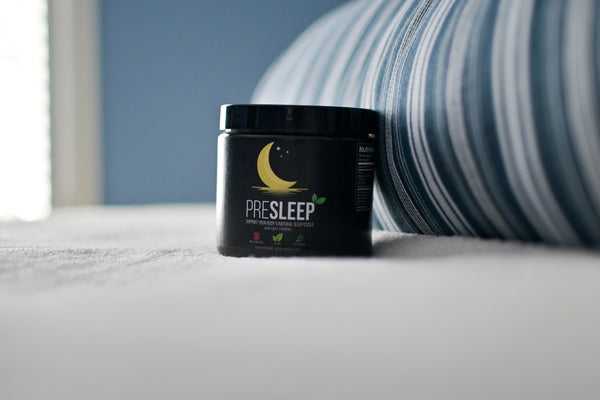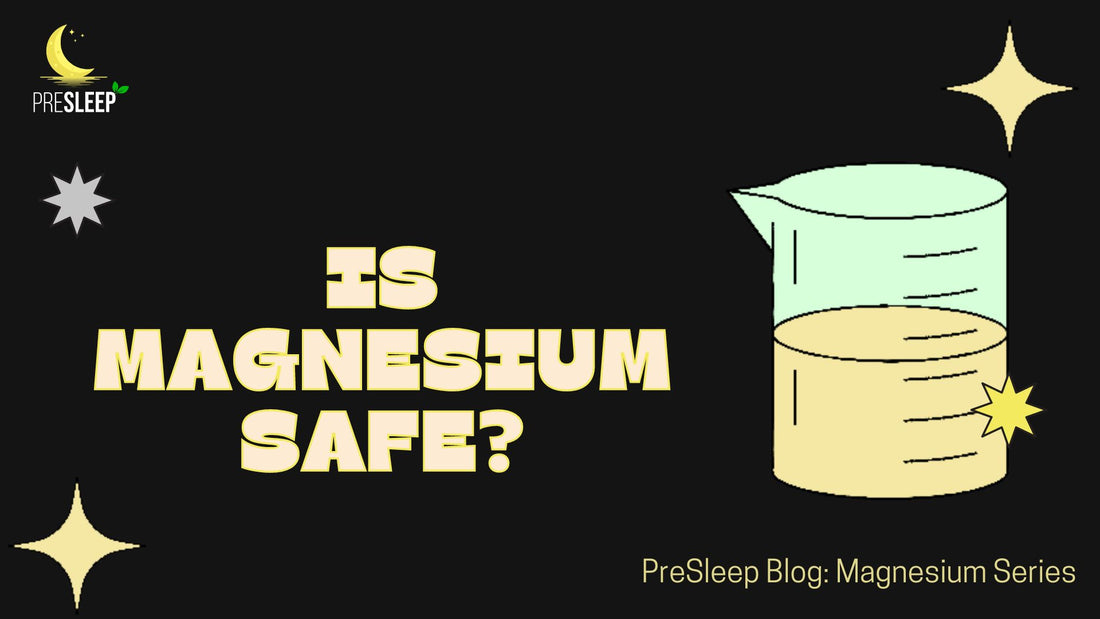In short, yes magnesium supplements are safe.
Magnesium is a mineral responsible for thousand of processes within the human body. Getting enough magnesium rich foods through diet is the safest route. Sometimes magnesium supplements can help with what the modern diet is leaving out.
Taking magnesium supplements is a great way to help improve our inflammatory diets and lifestyles.
To maximize the efficiency of taking magnesium supplements you should be exercising and eating a clean diet. Magnesium supplements may be a big mover in your health but you need to move too in order to get the full effects.
We would argue there is sufficient evidence magnesium is safe to take and we like to let the health professionals do the talking with their science backed research.
Remember: Supplements are not a band aid for poor lifestyle. They only work if you work.
What are Adequate Amounts of Magnesium?
The official dietary recommended allowance for an adult male is 400mg.
However, research suggests that the dietary magnesium intake can be in excess of this 400 mg recommended amount.
Optimal magnesium intake as studied by Mildred Seelig Ph.D and Andrea Rosanoff MD is about 5-10mg of pound of bodyweight. For more information on magnesium deficiency, check out their book "The Magnesium Factor".
Are we saying pop 10,000 mg of magnesium supplements throughout the day? Absolutely not.
High doses of oral magnesium supplementation can and will flush your bowels. Yes diarrhea.
How much magnesium you take is entirely up to you. If you just started to take magnesium supplements it's best to take a low dosage then take more as magnesium as you see fit.
It's best to consume multiple forms of magnesium and not just oral magnesium supplementation. Topical magnesium supplementation is a great way to treat inflammation at the source.
Magnesium is a secret weapon for an inflammatory modern environment.
The problem with today's society is most of us live a very sedentary lifestyle.
Some people sit at a desk for work, we order take out on lunch, and skip that work out because they're exhausted from the stress of work. Maybe throw on Netflix and binge the new show everyone's been talking about, next thing you know it's 12:04am and you set your alarm and try and cram a good night's rest into 4 hours.
It's a vicious cycle that most people have experienced once in their life. These habits build inflammation in the body because we aren't getting the nutrients we need. Lack of exercising and poor diet lead to unwanted weight gain, increased risk of chronic diseases, and decreased energy. Throw on top the fact the average person is exposed to environmental toxins such as air pollution, pesticides, and other heavy metals more than any time in human history.
Oh did we almost forget about viruses and bacteria too?

It shouldn't be a shock why most people walking around today aren't as healthy as our ancestors who grew, hunted, and ate their own food.
Magnesium levels are low today, most Americans today are magnesium deficient, which is a real problem.
Our body's response to inflammation is to send immune cells and release molecules called "cytokines". When the body has excessive calcium levels it prolongs and exaggerates the body's normal response to inflammation. The cytokines continue to seek inflammation because the calcium molecules are sending signals
The long term effects of hyperactivation of calcium pose risks of healthy tissues and health concerns. It crashes the mitochondria, which as we all know but can't really explain is the powerhouse of the cell, it runs rampant sapping energy and causing fatigue.
The primary defense to this excessive intracellular and extracellular calcium activation is having sufficient magnesium levels. Maintaining healthy magnesium levels is incredibly important and getting enough magnesium.
Since magnesium is constantly being used by the body for various functions it's best to hit your maximum daily intake.
How Magnesium Supports ATP Production
Magnesium plays a key role ATP (adenosine phosphate) is a high energy molecule that stores and transports energy within cells.
To release energy that fuels cellular processes like metabolism and energy production in cells it requires magnesium.
Magnesium in Mg-ATP development is one of the main forms of energy in every process of the body. Mitochondria need magnesium to produce ATP.
Think about that for a moment. 60% of Americans are deficient in magnesium and think about how important this biological process is to do almost anything!
Adequate magnesium levels are crucial to lower risk for inflammation and plenty of health benefits.
Benefits of magnesium intake
The production of ATP just scratches the surface of magnesium's many use cases:
-
Supports muscle and nerve function
-
Energy production
-
Blood sugar control
-
Prevent muscle cramps
Getting adequate intake of magnesium plays a key role in a healthy lifestyle.
Risks of magnesium deficiency
Magnesium deficiency can lead to serious health problems on a long enough time horizon.
Research suggests that magnesium deficiency is because our diet doesn't contain enough magnesium to support daily functions.
Here are the following risks low levels of magnesium:
-
Chronic illnesses
-
Inflammation
-
Migraine headaches
-
High blood pressure
-
Nausea
-
Constipation
-
Cardiovascular disease
Best forms of magnesium
The two best forms of magnesium are magnesium glycinate and magnesium chloride.
Magnesium glycinate is best taken before bed to help you relax and decompress.
Magnesium chloride or magnesium salts are applied topically on the skin. This helps aid inflammation on problem areas. It works great on the back of the neck.
Worst forms of magnesium
There are no bad forms of magnesium but some are better suited for different use cases.
However, magnesium oxide has the least amount of bioavailability.
Is magnesium citrate safe?
Magnesium citrate is safe but it is not the best form of magnesium you should take.
The problem with magnesium citrate is that it's bonded with citrate acid
Health Risks from Excessive Magnesium

Magnesium toxicity is the biggest risk of taking magnesium supplements.
The biggest risks of taking too much magnesium are lethargy, irregular heartbeat, and digestive issues.
Taking too much magnesium is pretty hard to do if you're being careful and not popping magnesium supplements like their tic-tacs. High doses of magnesium is a one way ticket to the toilet.
As we explained your body is constantly depleting magnesium to ward off inflammation and other critical body functions.
We would argue it's worse to take less magnesium than an increased magnesium intake.
Who shouldn't take magnesium supplements?
Not many people should take magnesium supplements, it depends on your risk factor. Although, excess magnesium can cause bowel flushing.
If you have diabetes, intestinal disease, heart disease or kidney disease do not take magnesium supplements without speaking to your primary health care provider.
A magnesium overdose with these comorbidities could be fatal.
Is magnesium an electrolyte?
No magnesium is a trace mineral found in diet, typically found in green leafy vegetables and fortified foods.
Is it okay to take Magnesium everyday?
As long as you're taking the daily recommended amount of magnesium a day, yes taking a magnesium supplement everyday is safe.
Since your body expends magnesium in countless biological processes it doesn't hurt to take magnesium everyday.
Adequate intake of magnesium is 400 mg per day.
What's the best form of magnesium for ADHD?
Magnesium L Threonate (magnesium citrate) is an excellent form of magnesium for ADHD.
It's show to help children reduce anxiety and boost mood. With plenty of research to back it up, here.
How much magnesium is safe during pregnancy?
Assuming you had a nice chat with your local care provider, 400 mg of magnesium per day is safe.
Anything over 500mg can cause magnesium toxicity. Fore more, check it out here.
PreSleep: Magnesium is Safe with Proper Dosage

PreSleep contains the recommended dietary allowance of magnesium of a dose of 400mg.
When magnesium glycinate is paired with other amino acids and trace minerals like l-theanine, zinc, and glycine they all work in harmony to ease your mind and relax your body to prepare for sleep.
Pre Sleep is a natural non-habit forming sleep aid and melatonin free sleep aid that contains all natural ingredients found in diet.
Medical Disclaimer: None of this is medical advice, for more information check out the national sleep foundation.
We're not doctors, we're passionate about getting you the best sleep we can. Magnesium supplementation is safe when under supervision by a primary physician.
If you're considering using magnesium, dietary supplements, or any other product as sleep aids, please consult a doctor.

